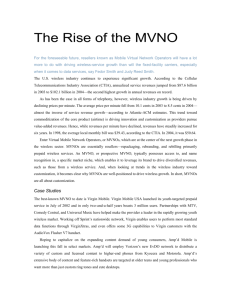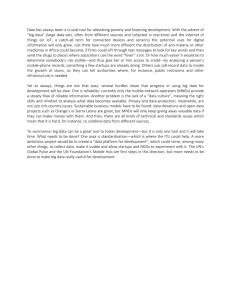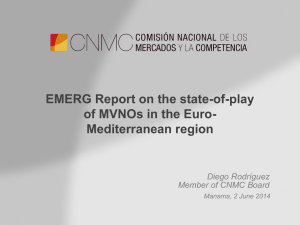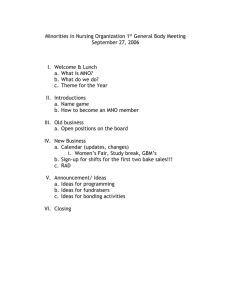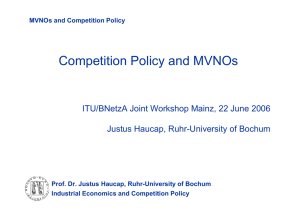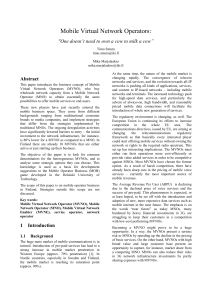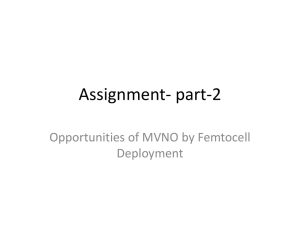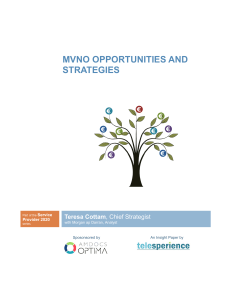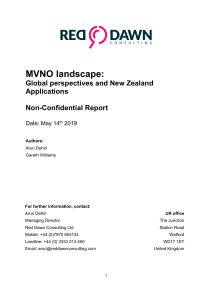MVNOs - competition policy and market development ITU workshop on 3G mobile
advertisement
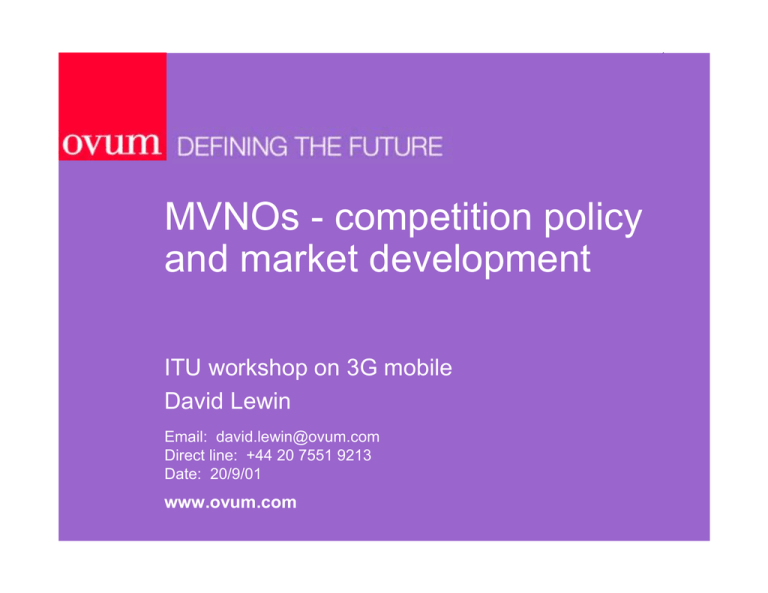
MVNOs - competition policy and market development ITU workshop on 3G mobile David Lewin Email: david.lewin@ovum.com Direct line: +44 20 7551 9213 Date: 20/9/01 www.ovum.com What is an MVNO? Characteristic Service provider Indirect access operator Enhanced service provider (ESP) Mobile virtual network operator (MVNO) Spectrum Mobile network operator (MNO) Licensed to use SIM card Brands host's Issues own SIM SIM cards cards Issues own SIM cards Network infrastructure Switch and transmission Varies Switch + HLR + transmission Switch + HLR + VLR + transmission Pricing Partially independent Partially independent Fully independent Fully independent Some Some Fully independence independence independent Fully independent Fully independent Branding 2 Why become an MVNO? Player Type of MVNO Example 3G only MNO 2G MVNO in home country to get early customer base Group 3G on EPlus 2G network 2G only MNO 3G MVNO in home country Bouygues Telecom 2G/3G MNO 3G MVNO in other countries eg Hard to find via reciprocal agreements examples 3G ESP/MVNO 3G MVNO in other countries Virgin Mobile 3 Supply conditions for the MVNO • Current supply conditions negotiated rather than regulated • Buying in bulk cheaper but riskier: Buy in bulk Pay roaming charges High risk - pay for capacity which may not be used Low risk - pay only for minutes used Poor cash flow - pay up front Good cash flow - inbound and outbound payments at same time Low price per minute - 30% (?) below retail prices High price per minute - at or slightly above retail (?) 4 The commercial case for MVNOs • Capex much lower than MNO but higher than ESP • 30% gross margin likely - but not enough for viable voice only business so….. • …..need to develop significant volume of value added data services • Important to get inbound as well as outbound revenue streams • Main MVNO capex (v ESP): • mobile switching centre/HLR/VLR • SIM cards • VA services and billing platforms • But no radio access network capex (v MNO) 5 The importance of inbound call revenues Outbound revenues Host mobile network MVNO 10 cpm Fixed network Inbound revenues 1 cpm 15 cpm Gross margin = 4 cpm on revenues of 15 cpm Host mobile network MVNO 10 cpm Fixed network 17 cpm Gross margin = 7 cpm on revenues of 17 cpm 6 The growing importance of MVNOs with 3G • 2G MNOs have resisted MVNOs and national roaming • 3G MNOs much more open to both • Why? • MNOs concerned whether 3G will give adequate ROCE given: •capex on licence fees •prospective capex on network roll out • National roaming cuts capex for 3G national coverage • MVNOs enable improve cash flow for 3G MNO by filling network early • MVNOs reduce risk of inadequate 3G revenues: •revenues dependent on innovative value added data services •revenue failure less likely with multiple service providers 7 Current regulation in support of MVNOs • Mandatory national roaming a possible route but… • Current EU framework offers little help • ….most NRAs restrict national roaming: • New EU framework may be better eg: • to stand alone 3G licensees - typically when 20% coverage reached • from 2G operators with 3G licences • Only Denmark requires 2G MNOs to offer national roaming to MVNOs. But at what price? • Regulated roaming rates typically > airtime reseller rates • separate markets for mobile call origination • CEC recognises need for clarification Will IRG report on mobile access (10/01) offer clarification? 8 The case for regulation for MVNOs • 3G MVNOs lead to more service competition and: • greater innovation • more chance that 3G will succeed early • Without regulatory support 3G MVNOs will not enter the market for the long term: • good negotiated supply conditions possible in short term (while MNOs want to fill their networks) but • long term MNOs will raise prices to drive MVNOs from the market and take full end user revenues 9 The case against regulation for MVNOs • Four or five 3G MNOs per country is enough for strong service competition • Adequate opportunities for MNOs and MVNOs to negotiate deals • Regulated supply to MVNOs likely to reduce investment: • danger that NRAs will set supply price too low • incentives for investment then switch from infrastructure to service 10 Are long term stable relationships possible? MVNO MNO low market share high licence fee Win/win strong brand innovative services understanding of key end users • MNO which raises prices and drives its MVNOs out of business not guaranteed to capture their customers 11 Regulating for MVNOs - Ovum view • Strong service competition if all 3G licensees successful • But how many will succeed? • Regulating price of supply to MVNOs will: •produce worse deal for MVNOs than negotiation (regulated price too high) OR •decrease infrastructure investment incentives AND •reduce chance of MNOs succeeding (regulated price too low) Conclusions for discussion • remove barriers to MVNO entry eg allocation of mobile network codes • leave MNOs and MVNOs to negotiate supply conditions • only intervene if clear evidence of market failure 12

